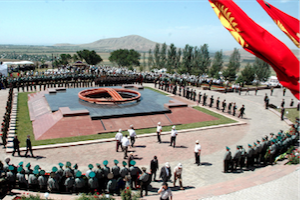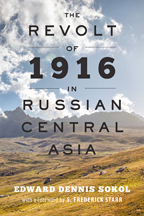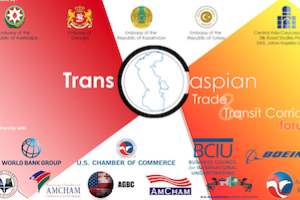Kazakhstan 2041: the Next Twenty-Five Years
Revolt in Central Asia: The Cataclysm of 1916

Revolt in Central Asia:
The Cataclysm of 1916
Wednesday, June 8, 2016, from 5 to 7 p.m.
(reception at 5 p.m., followed by the main program at 5:30)
A century ago, at the time of World War I, hundreds of thousands of Central Asians – Kazakhs, Tajiks, Turkmen, Uzbeks, and above all Kyrgyz – perished when they revolted against the tsarist Russian government's attempt to draft them into the army. Besides those who were killed outright, tens of thousands of Kyrgyz men, women, and children died trying to escape over treacherous mountain passes into China.
Soviet authorities have long suppressed Information on the 1916 revolt, but its Centennial has generated fresh interest, marked by seminars, mass meetings, and publications. Russia, in the meantime, has closed relevant archives and offered the curious thesis that the revolt was actually directed not against Russian rule, but against the authority wielded by the indigenous Turkic bourgeoisie.
The Central Asia-Caucasus Institute marks the centennial of the tragic loss of Central Asian life with two major publications: a new edition of the book The Revolt of 1916 in Russian Central Asia by Edward Dennis Sokol, with foreword by Dr. S. Frederick Starr (JHU Press); and a Silk Road Paper entitled Central Asia in Revolt: the Cataclysm of 1916, edited by Zamira Sydykova. Both of these publications will be presented and discussed at this forum.
This event can now be viewed on the SAIS Events YouTube channel.
Speakers will include:
Zamira Sydykova, Ambassador, Editor in Chief, Res Publica Newspaper
Dr. Prof. Mirzokhid Rakhimov, Visiting Fulbright scholar at Central Asia-Caucasus Institute/Head of the Dept. for Contemporary History and International Relations, Institute of History, Academy of Sciences, Uzbekistan.
Moderator: S. Frederick Starr, Chairman, Central Asia-Caucasus Institute.
Rome Building Auditorium
SAIS - Johns Hopkins University
1619 Massachusetts Ave., NW
Washington, DC 20036
Click here to RSVP and register
The Revolt of 1916 in Russian Central Asia
Edward Dennis Sokol, with a foreword by S. Frederick Starr
Paperback, 208 pages, 1 map
ISBN:9781421420509
May 2016
Follow this link to order a copy of the book
TRANSIT FORUM: Trans-Caspian East-West Trade and Transit Corridor
TRANSIT FORUM with the Embassies of Azerbaijan, Georgia, Kazakhstan, and Turkey
Thursday, 28 April, 2016, from 8 a.m. to 4 p.m.
The Central Asia, Caspian, South Caucasus and Black Sea regions together form a strategically important transit corridor between China and Europe. Connecting trade, people and economies, the modern trans-Caspian trade and transit routes from China to Europe, envisages an extensive and integrated network of infrastructure, special economic zones, harmonized customs, and cross-border procedures along this route.
Azerbaijan, Georgia, Kazakhstan and Turkey combined represent a market of more than 110 million consumers. These countries are able to offer customized and integrated solutions to companies with highly sophisticated supply chains.
Video of the forum can now be viewed on the SAIS Events YouTube channel.
On Thursday, April 28, 2016, the Embassies of Azerbaijan, Georgia, Kazakhstan, and Turkey to the U.S.A., are organizing the “Trans-Caspian East-West Trade and Transit Corridor” Forum in Washington, D.C., in partnership with the World Bank Group, U.S. Chamber of Commerce, Business Council for International Understanding, Boeing Company, U.S.-Azerbaijan Chamber of Commerce, AmCham Azerbaijan, America-Georgia Business Council, U.S.-Kazakhstan Business Association, AmCham Kazakhstan, AmCham Georgia, and Turkish-American Business Association/AmCham Turkey.
This special all-day forum, hosted by the Central Asia and Caucasus Institute at SAIS-Johns Hopkins University, will introduce projects and investments along the modern Silk Road to U.S. business leaders across a variety of multinational industries.
Speakers at this special forum include: Ambassador Elin Suleymanov, Azerbaijan; Ambassador Archil Gegeshidze, Georgia; Ambassador Kairat Umarov, Kazakhstan; Ambassador Serdar Kılıç, Turkey; Mr. Gary Litman, VP, US Chamber of Commerce; S. Frederick Starr, Chairman, Central Asia-Caucasus Institute, JHU-SAIS; Dr. Taleh Ziyadov, Director-General, Baku International Sea and Trade Port; Mr. Rauf Valiyev, Chairman, Azerbaijan Caspian Shipping; Mr. Mamuka Bakhtadze, CEO, Georgian Railways; Ms. Ketevan Salukvadze, Head of Transport Policy Dept., Ministry of Economy and Sustainable Development; Mr. Askar Mamin, President, Kazakhstan Railways; Mr. Sanzhar Yelubayev, President of KTZ Express; Mr. Osman Nuri Beyhan, Deputy Director General for EU and International Affairs, Ministry of Customs and Trade; and others TBA.
Schedule, Thursday, 28 April 2016:
8:00 - 9:00 a.m. Continental breakfast
9:00 - 10:00 a.m. Welcome by the Central Asia-Caucasus Institute, the US
Dept of State, Ambassadors of Azerbaijan, Georgia,
Kazakhstan, and Turkey, and representatives from the US
Chamber of Commerce
10:00 - 11:00 a.m. Panel #1: "Trans-South Caucasus Customs and Trade
Facilitation: What Needs to Be Done?"
Moderator: S. Frederick Starr
11:00 - 11:25 a.m. Q & A
11:25 - 11:40 a.m. Break (refreshments)
11:40 - 12:40 p.m. Panel #2: "'From Sea to Sea' Integrated Regional Transit
and Logistics Infrastructure."
Moderator: TBD
12:40 - 1:00 p.m. Q & A
1:00 - 2:00 p.m. Lunch served in the auditorium
2:00 - 3:00 p.m. Panel #3 "Commercial and Investment Opportunities:
Financing, Logistics, and Supply Chain."
Moderator: Jorg Frieden, Executive Director, The World
Bank Group
3:00 - 3:25 p.m. Q & A
3:25 - 4:00 p.m. Closing remarks
SAIS - Johns Hopkins University
1740 Massachusetts Ave., NW
Washington, DC 20036
Kazakhstan: An Island of Stability in a Turbulent Region
By Vladimir Socor
ISDP Policy Brief no. 191
December 22, 2015
The year now ending marked a milestone in Kazakhstan’s rapprochement with the European Union. On December 21, 2015 in Astana, the EU’s High Representative for Foreign and Security Policy, Federica Mogherini, and Kazakhstan’s Minister of Foreign Affairs, Yerlan Idrissov, signed the EU-Kazakhstan Enhanced Partnership and Cooperation Agreement. This new-generation Agreement replaces and upgrades an earlier, less ambitious document. Kazakhstan is the first Central Asian country to achieve this status vis-a-vis the European Union. This status puts Kazakhstan ahead of Russia in terms of official relations with the EU; moreover, the Kazakhstan-EU relationship is trouble-free.
Kazakhstan and Europe: Towards a New Partnership
By Michael Emerson
ISDP Policy Brief no. 190
December 21, 2015
Click here for the PDF version of the Policy Brief
On December 21, 2015, the European Union and the Republic of Kazakhstan signed the new Enhanced Partnership and Cooperation Agreement in the Kazakh capital, Astana. The new agreement replaced the original one that has been in force since 1999 and it is considered as a significant step for both sides to advance relations and strengthen political and economic cooperation. This development took place in a year when Kazakhstan joined to the World Trade Organization (WTO). In fact, the two agreements are deeply inter-locked: the Enhanced Partnership and Cooperation Agreement was signed only on condition and after Kazakhstan's accession on WTO. However, Kazakhstan is also a full member of the Eurasian Economic Union, which complicates its relationship with the European Union.




